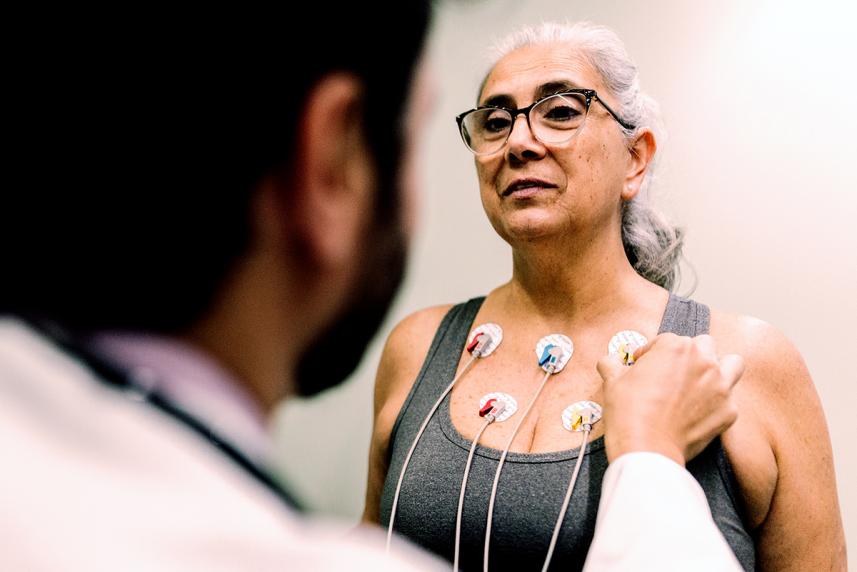Know your heart health
Learn about the tests that can help you stay on top of your heart disease risk.

Heart tests can help you and your doctor better understand your risk for heart disease. Here are three tests you should know about.
Cholesterol test
This simple test measures the cholesterol and other fats in your blood. Cholesterol is a waxy substance that keeps your cells and organs healthy. But if you have too much, it can build up in your arteries and keep your heart, brain, and limbs from getting enough blood and oxygen.
Who it’s for: The National Heart, Lung and Blood Institute recommends that people aged 65 and older be screened annually.
Your provider may recommend more frequent tests if your results are abnormal, or if you have other risk factors, including:
- A family history of high cholesterol or heart attacks
- Being overweight or obese
- Diabetes
- Smoking
What to expect: Your provider will use a small needle to collect a small amount of blood from a vein in your arm. You may feel a slight sting, but otherwise the test is quick and painless.
Why it’s important: “A cholesterol test can reflect your chances of developing plaque in your arteries, which can lead to heart attacks and strokes,” says Aeshita Dwivedi, M.D., a cardiologist at Lenox Hill Hospital in New York City.
Healthy cholesterol ranges for adults:
HDL (good) cholesterol: 60+
LDL (bad) cholesterol: under 100
Total: under 200
Your doctor will also talk to you about triglycerides and other types of cholesterols and fat.
Blood pressure test
Included in most checkups, a blood pressure test measures the force on the walls of your arteries as your heart pumps. It lasts only about one minute, but it’s a key part of general health care.
Who it’s for: It’s recommended annually for adults 40 and older and for those at increased risk for high blood pressure.
You may be at higher risk if you’re overweight or obese, use tobacco, or if you have diabetes or a family history of high blood pressure. You can use a home monitor if your doctor says to check more often.
What to expect: Your provider will wrap a cuff around the top of your arm, then measure your pulse. Your provider may also use a stethoscope.
A healthy blood pressure reading is anything below 120/80, which is generally read as “120 over 80.” Readings outside this range may indicate hypertension or a higher risk for it.
Why it’s important: “Blood pressure is a good marker of your overall health,” Dr. Dwivedi says. In particular, it reveals how likely you are to develop high blood pressure, or hypertension, which increases your risk for other health problems, such as heart disease, heart attack, and stroke. It usually has no warning signs, and many people don’t know they have it before getting a test.
Electrocardiogram (EKG or ECG test
An EKG test (sometimes called an ECG) is a simple, painless procedure that measures electrical signals in your heart to test if it’s beating at a normal rate and strength. It can also show the size of the heart muscle.
Who it’s for: You may get an EKG test as part of a routine health exam. Your health care provider may also recommend an EKG test if you have a family history of heart disease or have symptoms of a heart disorder. Symptoms include chest pain, rapid or irregular heartbeat, shortness of breath, dizziness, and fatigue.
What happens: An EKG test takes only a few minutes. You’ll lie on an exam table, and your provider will place several small sensors (electrodes) on your arms, legs, and chest. The sensors are sticky patches with wires that connect to a monitor to record your heart’s electrical signals.
Why it’s important: Your health care provider can use the EKG information to diagnose or monitor the following: irregular heartbeat (arrhythmia), blocked arteries (coronary artery disease), heart damage, heart failure, or heart attacks.
Stay on top of your heart health
Have you had your annual wellness visit this year? If not, schedule one today!
The dental-heart connection
This may come as a surprise, but oral health plays a role in your heart health. “Preventive oral care is crucial to overall health, at all stages of life,” says Nipa Thakkar, D.M.D., of Thakkar Dental Care in West Chester, Pennsylvania.
In addition to dental problems, routine visits can help detect many other serious medical conditions. “Heart disease, diabetes, and pneumonia are known health conditions in seniors that have a relationship with our patients’ oral health,” says Thakkar.
An oral exam may also help spot oral cancer, head and neck pathologies, nutrition deficiencies, and sleep-related breathing disorders at early, more easily treatable stages.


